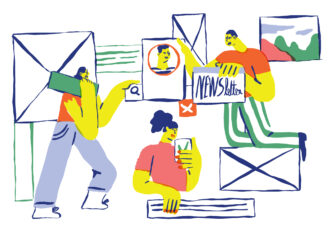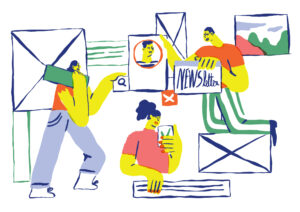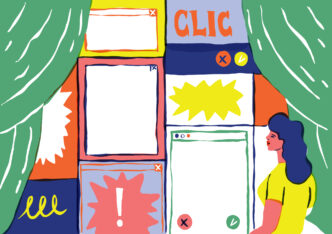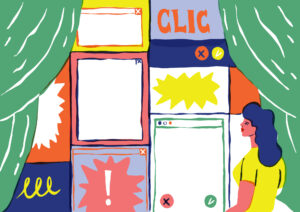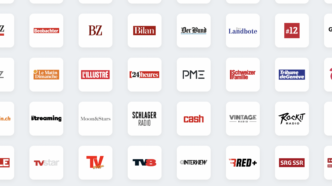
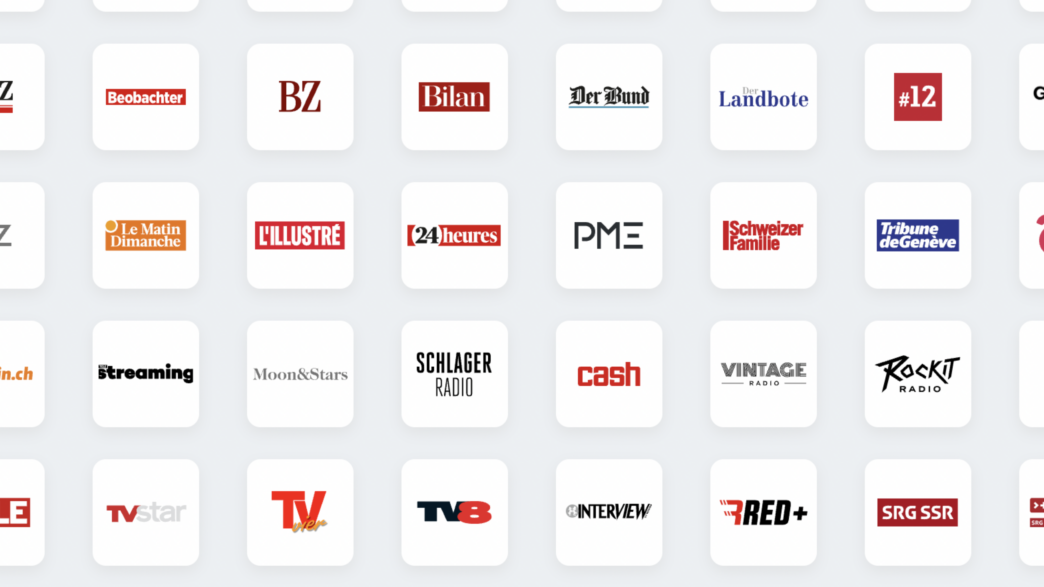
OneLog is the joint login service for the Swiss Digital Alliance – the federation of the largest Swiss media companies and publishing houses. The single login enables publishers to offer readers a personalized, cross-platform media experience whilst guaranteeing the highest security standards. I spoke to Patrick Rademacher, COO of the Global Media Unit at Ringier AG & Chairman of the Board of OneLog, and Silvano Oeschger, CEO at OneLog, to hear more about this single sign-on solution and how it’s benefiting both Swiss media and their readers.
What is OneLog and why did you launch it? What was the impetus behind it?
And there’s a pressure to solve this problem before the end of 2024, the already-pushed-back date for Google to discontinue 3rd party cookies.
So, these media companies decided to launch a project group with the goal of developing a login service to regain a direct relationship between media companies and their users, enabling publishers to improve their 1st party data basis and understanding of their audience.
Testing was run across various publications from October 2019 with title-specific, voluntary logins to discover readers’ propensity to create an account. After seeing the success of these tests and reader’s increased acceptance to log in, the decision was finalized to align on a technological solution. The chosen tech was one developed by Ringier, its in-house technology Ringier Connect which was tailor-made for the specific needs of media brands, and live from August 2021 when other publishers, such as 20 Minuten and Tamedia were onboarded into the solution.
And, just like that, OneLog was born!
Today, OneLog has onboarded 47 media brands, including titles from the Ringier and TX Group, and more recently, a joint job marketplace from the Ringier and TX universe, allowing their user base to grow to more than 2.3 million verified accounts.
After an initial phase, when Ringier and TX held 50% of the shares, OneLog is now owned by the four biggest private media companies in Switzerland, Ringier, TX Group, NZZ, and CHMedia. As a result, selected titles of NZZ and CHMedia will migrate to the single sign on solution by the end of the year. In the midterm, all of the shareholders’ titles will switch to OneLog. The fifth founding partner of the Swiss Digital Alliance, the public broadcaster SRG SSR, already uses OneLog as a 3rd party login for its streaming platform PlaySuisse. But this isn’t intended to be the end of the growth. OneLog is open to include all small and medium-sized media companies in Switzerland.
What are the main benefits of OneLog for media brands?
The end to third-party cookies is a pain point for all publishing companies, but the perceived urgency varies across brands. So, when the OneLog team works to bring a publisher onto the solution, focus is placed on this lack of data which means products can’t be built with the reader’s needs in mind.
- A state-of-the-art login solution with the latest features (e.g. FaceID, TouchID), from Switzerland for Switzerland, and one that is easy to integrate as it complies with the standard, with open APIs to connect to other technologies
- Cost sharing – OneLog is not a profit center expansion of the respective 1st party database. However, there is no cross-company data exchange (we’ll come onto that later)
- On this same topic, smaller publishers can benefit from the larger companies in the technological game to keep up with the speed of change
- 100% GDPR compliance
- All the benefits that come with logging a user. The participating media companies can increase advertising revenue, personalize user experiences, collect first-party data and learn about their audience to improve every aspect of their business. And, of course, registration increases reader propensity to subscribe by up to 40%.
OneLog’s thinking is also that the more media companies who use this solution, the better it is for everyone. Users will only have a single registration before they can log in everywhere.
“OneLog is a vital component of our registration strategy at Blick Group. For those users who have existing login credentials from any other big media brand in Switzerland, the ability to utilize the same credentials to access our platform removes a significant barrier to entry. This streamlined registration process aids us in broadening our user base. OneLog’s stringent commitment to upholding data privacy and safeguarding user information amplifies the trust our users place in our login infrastructure, a factor critical for fostering strong audience relationships in the digital age.”
Adrian Gottwald, Head of Reader Revenue at Blick Group
What about the benefits for readers? Why should they create an account?
- Simplicity. With a single registration, users gain access to numerous online offerings from different media companies
- OneLog relies on the highest security standards and, with the option of two-step verification, their account is even more secure (OneLog recently got awarded with the digital trust label for instance). We all know and use Google SSO, but we actually don’t really know what they do with our data. So, the goal is to be a more trusted, secure login system.
- Personal details can be managed by the user centrally and conveniently in one place (“user cockpit”)
- A state-of-the-art login solution with the latest features (e.g. FaceID, TouchID), from Switzerland for Switzerland
What is the user experience on OneLog?
I tested this out for myself on a variety of media brands using the OneLog service, and the experience is extremely smooth and simple.
As the team highlighted, the user’s main touch point is with the publisher rather than OneLog. The goal here is to build trust with individual brands and help readers understand how their data is being dealt with. After all, the publisher’s content is the reason why users come in the first place, and the reason why this should always be the main focus. OneLog is simply the facilitator to get these users registered.
Whilst the registration page is fairly similar across partners, to keep some kind of consistency, the branding differs based on the publisher’s house style. For example, below is the landing page for registration on L’Illustré and Blick.
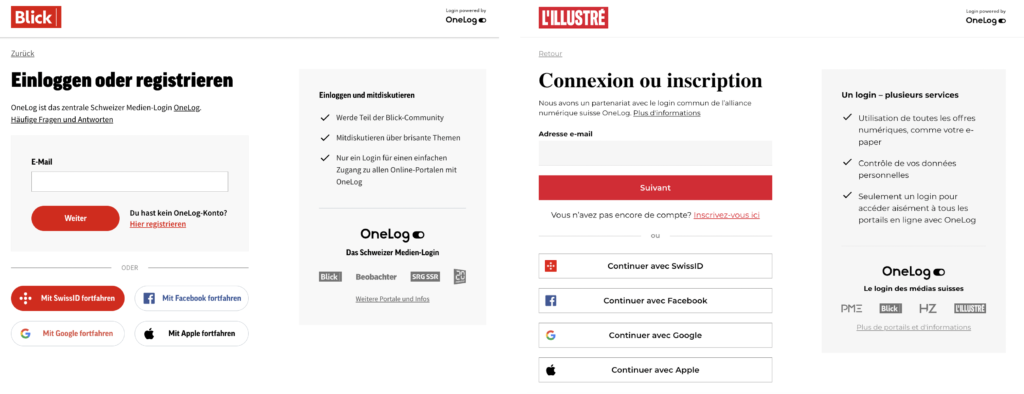
After creating an account, I’m emailed to confirm.
I was then curious as to whether I would be automatically logged into another OneLog publication if I visited their website after having already created an account.
On Bilanz’s website, for example, I arrived on the homepage and wasn’t automatically logged in. However, upon clicking on the ‘Account’ icon in the header, I was presented with a OneLog page that asked me if I’d like to link my existing account. At this stage, I have the chance to provide further information (for personalization reasons, as the first step only required my email and password) as well as accept the terms and conditions of this specific brand.
How is OneLog already benefiting publishers?
Marc Isler, CRO at Tamedia, shared how they’ve been using OneLog since 2020 rather than self-building a login solution. They also strongly believe that an independent Swiss solution for login will bring value to users across Swiss media platforms.
This decision has also proved valuable for their reader revenue model:
Logging in users and getting them to try the [premium] product for free for two weeks has helped us a lot to grow our known user base, who we can then target, primarily through email, both with a specific registration onboarding journey and then with subscription offers.
We have really focussed on a full registration strategy for anonymous users first, then converting them into subscribers after the 14 day trial phase. In summer last year, we realized that, in the post-covid period, we needed to test more flexible approaches – so we mixed in special longer term subscription offers also for anonymous users and have gained really strong results in directly converting them.
Those results gave us confidence to move away from the two-step strategy and we have implemented the direct subscription offers based on Piano’s propensity model (LTS) in March, offering a 1-month free trial to lower and no score groups. So far the results look great. What we have changed now is to use the login mechanism for all new newsletter subscribers and we have further testing planned for low LTS cohorts to first push them specifically to the editorial newsletter sign ups, as we see very strong results in general of subscription conversions coming from our editorial newsletters.
We generally manage to convert 3-8% of our registered users to subscribers – and we’re getting better and better at it. OneLog as an industry standard has certainly helped us, as user acceptance for logging in has increased with it, but also the habit of logging in with OneLog (easy and secure).
What about data sharing between publishers and OneLog?
There is no data lake. Every company is in charge of its own first party data.
Of course, this is a limitation of OneLog as it’s every advertiser’s dream to have access to this kind of data lake. But it’s also the beauty of the solution’s game. Privacy for readers is a priority, and OneLog only collects the data necessary for a secure and user-friendly login service.
There are two kinds of data collected:
- The basic data collected by OneLog that is required for registration are e-mail address, password, if applicable surname, first name, title
- OneLog also stores additional data on behalf of individual partners. But this data is only accessible to the respective partner, allowing each publisher to build up their own first-party strategy.
One of the next steps for OneLog is also to evaluate password-less options which could potentially provide more security for the platform, but they’re seeing how the adoption goes in the market.
Ultimately, this is the proof of concept that industry alliances can work and prove beneficial for both publishers and readers.
“This is a very important message. There are so many fields where we do not compete with each other, where the real competition is somewhere else, where we can share costs, for example, or work together for the sake of the whole industry… it’s this that we’re trying to achieve here.”
Patrick Rademacher, COO of the Global Media Unit at Ringier AG & Chairman of the Board of OneLog
Thank you very much to Patrick and Silvano for taking the time to talk to me! I think the OneLog model is a brilliant example to set for the rest of the world to follow.





